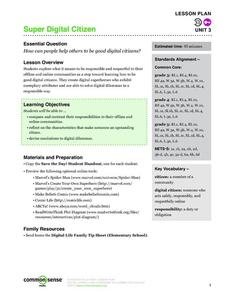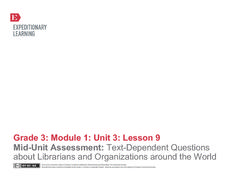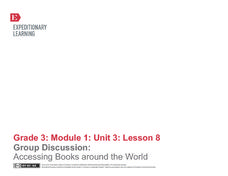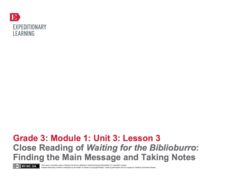Baylor College
Need or Want?
Even as adults it can be hard to distinguish needs from wants. Using pictures of common, everyday items, children make a pocket chart separating the objects they need from those that they want. Discuss their choices, explaining that...
Baylor College
Needs of Living Things: Pre-Assessment
Determine your class's prior knowledge about the necessities of life with this pre-assessment for a unit on living things. Learners draw pictures of themselves with all the things they need to live, grow, and survive. These drawings will...
Baylor College
What's That Food?
Get things cooking with the first lesson in this series on the science of food. Working in small groups, young scientists make and record observations about different mystery foods. These descriptions are then shared with the class and...
California Academy of Science
Tropical Belt
Where in the world is the equator? Explore a world map with your class, coloring in oceans, continents, and rainforests while locating the three major lines of latitude: the equator, Tropic of Cancer, and Tropic of Capricorn. Discuss how...
California Academy of Science
Be Prepared for an Earthquake
Earthquakes can be frightening and dangerous, but being prepared can make a world of difference. Perform an earthquake simulation during which the class practices how to drop, cover, and hold on as you read a script describing what might...
California Academy of Science
Coincidental Colonization
The Galápagos Islands are an amazing place of isolated adaptation, colonized by an interesting mix of plants and animals. The class plays a game to help them understand how these organisms came to live on the island through a combination...
EngageNY
Close Reading of Bullfrog at Magnolia Circle: Predators and Prey
Reading is fantastic, especially when it's reading about bullfrogs. Kids get cozy with predator/prey relationships as they hone their information-reading skills. They start out as they read a portion of the text aloud, then they...
Common Sense Media
Super Digital Citizen
Teach your charges how to become responsible digital citizens with superheroes! Start out with a brief class discussion about what acting safely, responsibly, and respectfully looks like. Next, have each pupil create their own digital...
California Academy of Science
Banishing Bycatch
Bycatch is a sad reality for many sea turtles, dolphins, and sharks; it occurs when they get unintentionally caught in commercial fishing nets. The class plays a game using popcorn and crackers, each child will attempt to catch the...
California Academy of Science
Carbon Cycle Role Play
Anytime you make concepts clear with role playing or hands-on experience, it's a win for the whole class. Ping-Pong balls are used to represent carbon in a carbon cycle role-play activity. In small groups, children first discuss what...
EngageNY
Mid-Unit Assessment: Answering Text-Dependent Questions About Librarians and Organizations Around the World
This is a skills-based assessment that asks test takers to use textual evidence to determine the main idea of an excerpt from an informational text as well as respond to text-dependent questions. The assessment is the middle point...
EngageNY
Group Discussion: Accessing Books Around the World
Continue work with an informational text by following the procedures detailed here. The plan, part of a series, focuses on My Librarian is a Camel. Class members complete text-dependent questions and then prepare for and participate in a...
EngageNY
Close Reading of Excerpts from My Librarian Is a Camel: How Do People Access Books Around the World?
Acquaint your class with informational text through a close reading. First, examine a couple of pages together, looking at text features and content. The whole class focuses on marking down a brief summary of each paragraph before...
EngageNY
Close Reading of Waiting for the Biblioburro: Finding the Main Message and Taking Notes
Expose your class to Waiting for the Biblioburro, narrative nonfiction that will act as the bridge between ficiton and informational texts to come. Class members do a close reading of the text, looking at excerpts instead of the whole...
EngageNY
Continued Close Reading of Waiting for the Biblioburro: Comparing and Contrasting the Children in Colombia, Appalachia, Chad, and Afghanistan
Focus on similarities and differences with a jigsaw activity that requires pupils to compare Waiting for the Biblioburro to other texts they have read. To prepare, class members first respond to text-dependent questions, moving on to...
EngageNY
Reading Maps: Locating the Countries We Have Been Reading About
Show your class how to read a map and decipher all of the markings and features. Start out by connecting maps to their homework from the night before and their current reading, in this case That Book Woman, and a related informational...
EngageNY
Vocabulary: Finding the Meaning of Words in Context in The Boy Who Loved Words
Here is a lesson plan that invites learners to engage in a kinesthetic activity that allows them to physically move and manipulate words in order to think about ways to understand vocabulary in context. After that activity is complete,...
Core Task Project
Whatif by Shel Silverstein
What a skillful way to incorporate Shel Silverstein, a wonderful author, into the classroom. Composed of three tasks, children are led through a series of text-dependent questions that force them to unveil the meaning of Silverstein's...
EngageNY
Close Reading of The Boy Who Loved Words: How Do People Build Their Word Power?
Third graders practice the skills of identifying the main message in a story, describing the main character, and sorting the key details of a story into specific categories. The story they read is, The Boy Who Loved Words. Using a...
EngageNY
Close Reading of Nasreen's Secret School: How Do People Access Books in Afghanistan?
Third graders continue to practice the close reading skills of capturing the gist and reading again for important details in the sixth instructional activity in a larger unit. This is a great beginning-of-the-year unit for establishing...
EngageNY
Informative Paragraph Pre-Assessment: What Is One Reason You Want the Power of Reading?
This writing pre-assessment has minimal instruction but maximum support and encouragement. It begins with a review of the book, Rain School, through a think-pair-share and small group discussion. The discussion focuses on the idea that...
EngageNY
Talking with My Peers: Carousel of Reading Superheroes Around the World
In many places in the world, people go to great lengths to get books to read. This beginning-of-the-year activity uses pictures of people reading in extraordinary situations to stimulate effective listening and speaking using the...
Curated OER
Because of Winn-Dixie
Readers analyze an excerpt from Kate DiCamillo's novel Because of Winn-Dixie. They read silently, and then hear it read aloud. Definitions for underlined vocabulary words are in the margin, and other potentially difficult words are in...
Curated OER
Decision Making: Who Was Right?
Help your class explore the question "Is it ever right to disobey a law?" With a strong base of knowledge about the Civil War, anti-slavery movement, and Underground Railroad, your class explores civil disobedience in Marshall, Michigan...

























